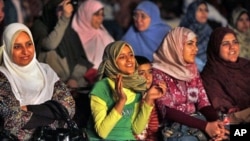As Egypt holds the second phase of post-revolution elections, some in the West are alarmed by the front-running status of Islamist parties. But some Islamists are raising alarms of their own, warning of Western-style freedoms, such as gay marriage, to bring voters to their side.
Umm Radwan walks beneath the palms on a sidestreet of Mit Rahina, holding the hand of her young son as he practices his recitation of the Quran.
The boy and his mother, her face concealed by the full veil of the niqab, reflect the deep faith and tradition that pervades much of Egypt, especially in villages like this just south of Cairo.
|
A Cautionary Tale
|
Conservative values have been a boon to Islamist parties in the parliamentary elections. Religious parties have taken a majority of seats in the first phase, a shock to some who hailed the liberal, secular values of the revolutionaries earlier this year.
Now in this phase, Islamists appear poised to do even better, with more rural voters having their say in charting Egypt's future. In a nearby mosque, the sheikh is careful not to chose sides in the political contest.
But he tells the faithful that democracy means respecting everyone's rights, which he says would allow for same sex marriage, or people drinking alcohol on the streets.
Framed that way, Umm Radwan says she wants no part of it. She says that is impossible; Egypt will never allow it. Another of Mit Rahina's residents, Saad Darwish, agrees, saying choice only goes so far.
"Islamic people - they can be democratic, but Islamic democratic. Not people drinking and making problems, making some not-good things, do you understand me? Here, a man doesn't marry a man, not a lady marry a lady. We don’t like this," Saad stated.
The main Islamist groups, the Muslim Brotherhood's Freedom and Justice party and especially the more conservative Salafis' Nour party, have played very well into these cultural taboos.
Said Sadek is a professor of political sociology at the American University in Cairo. "They talk about alcohol as if Egypt is full of alcohol - wherever you go you will find trees dropping Johnnie Walker and other [alcohol], not fruit. In addition, they talk about bikinis. I mean, those people live in squatter settlements and poverty and you don't see bikinis anywhere. As if you would walk anywhere in Egypt and women are walking in bikini. It doesn't exist," he clarified.
While bikinis and booze may seem a false argument, the issues resonate not only with the traditionally conservative, but also, Sadek argues, with a sizable portion of a key voting bloc. "The aim of the speech is to mobilize frustrated young men, [the] unemployed," he said. "They talk about alcohol. They talk about bikini [-clad] women and so the guys are very much interested."
But there are signs the frustrations of these young men and others in Egypt will ultimately win out over what Sadek considers distractions. Economic problems were as much at the heart of Egypt's revolution as politics.
Umm Radwan says any group that makes the economy worse is doomed to fail, no matter what its social and human rights policies. Villager Darwish agrees on the economic front. He believes that any turn to a stricter interpretation of Islam would be slow in coming - despite a new constitution on the horizon.
He thinks voters will correct any mistakes they might make now when they vote in the next election.
"[If] anybody succeeds and helps the people, [they will] come again [be re-elected]. If they don't help the people, they won't come again," Darwish explained.
Darwish may have deep commitment to his conservative values, but his words indicate an equal faith in the powers of democracy.
(16 Dec correction: atribution of the first quote changed from Sadek to Saad)




